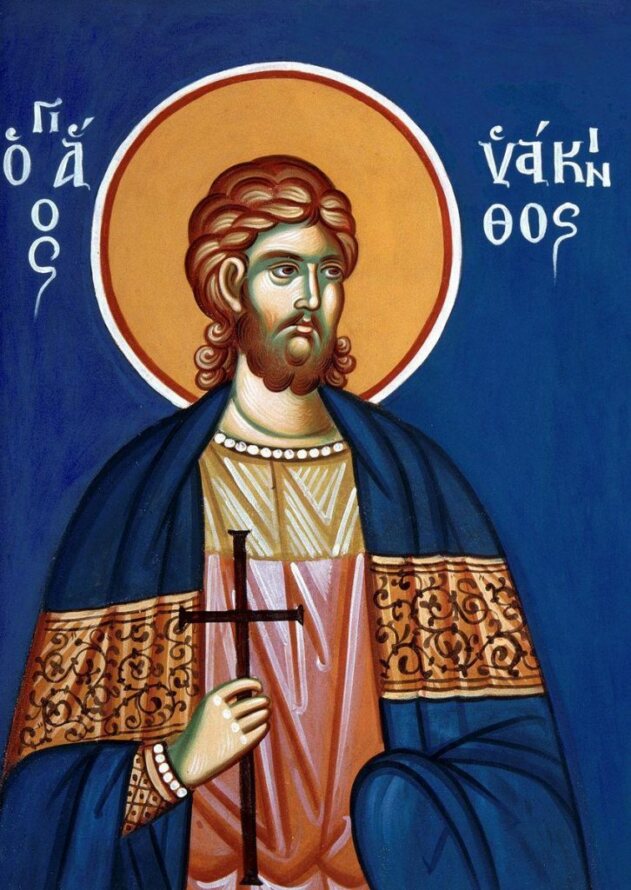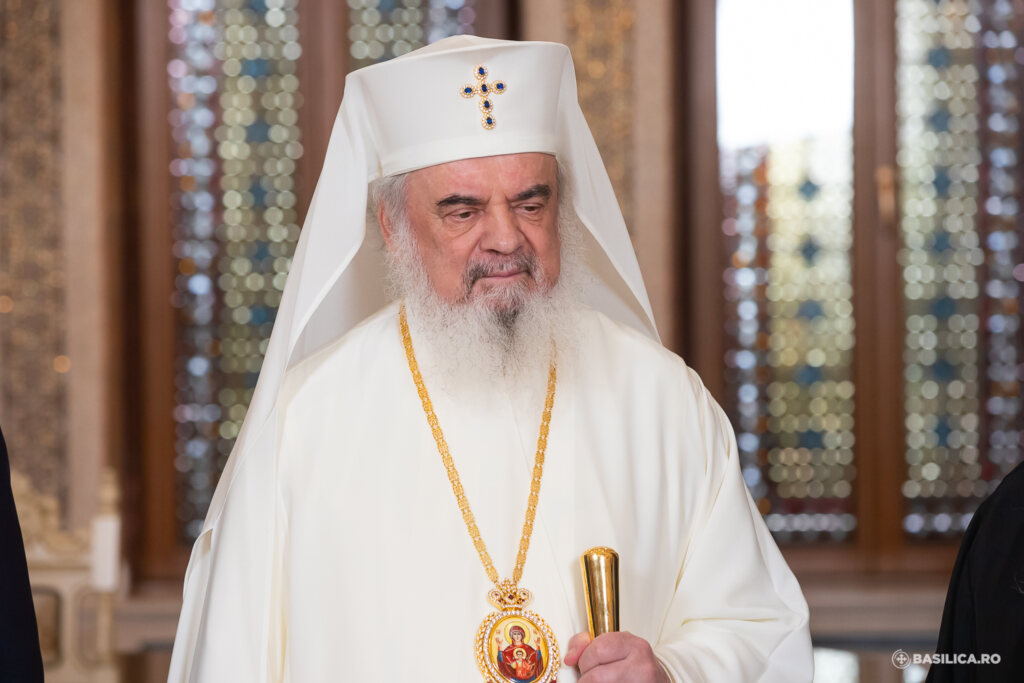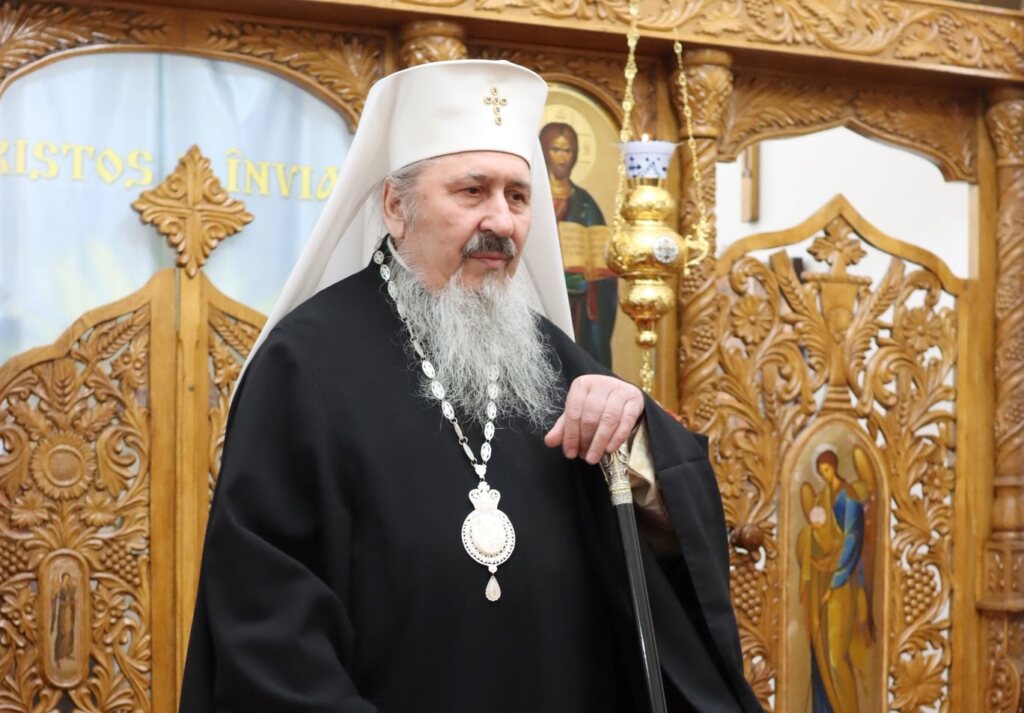Martyr Hyacinth of Caesarea, in Cappadocia
Saint Hyacinth, a native of Caesarea in Cappadocia, was raised in a Christian family. The emperor Trajan made the boy his “cubicularius” (chamberlain), unaware that he was a secret Christian.
One day, while the emperor and his entourage were offering sacrifice to idols, the young Hyacinth remained at the palace, shut himself up in a small room, and prayed fervently to the Lord Jesus Christ.
One of the servants overheard him praying and denounced him to the emperor. He said that although Hyacinth was entrusted with an imperial position, he did not honor the Roman gods, and was secretly praying to Christ.
Hyacinth was brought to trial before Trajan, who tried to persuade him to deny Christ and sacrifice to the deaf and dumb idols, but the holy martyr remained steadfast and declared that he was a Christian.
He was whipped and thrown into prison, where the only food given to him was what had already been offered to the idols.
They hoped that he would be overcome with hunger and thirst and eat it. Saint Hyacinth did not eat the food, and he died after thirty-eight days. When they came to torture him again, they found his dead body.
The jailer saw two angels in the cell. One covered the saint’s body with his own garment, and the other placed a crown of glory on his head.
The twelve-year-old Hyacinth suffered for Christ in the year 108 in the city of Rome. Later, the saint’s relics were transferred to Caesarea.
Troparion — Tone 4
Your holy martyr Hyacinth, O Lord, / through his suffering has received an incorruptible crown from You, our God. / For having Your strength, he laid low his adversaries, / and shattered the powerless boldness of demons. / Through his intercessions, save our souls!
St. Anatolius the Patriarch of Constantinople
Saint Anatolius, Patriarch of Constantinople, was born at Alexandria in the second half of the fourth century, at a time when many representatives of illustrious Byzantine families ardently strove to serve the Church of Christ armed with Greek philosophic wisdom. Having studied philosophy, Saint Anatolius was ordained a deacon by Saint Cyril of Alexandria (January 18).
Anatolius was present at the Third Ecumenical Council at Ephesus in the year 431 (September 9), at which the holy Fathers condemned the false teaching of Nestorius.
Saint Anatolius remained a deacon at Alexandria and after the death of Saint Cyril (+ 444), when the See of Constantinople was occupied by Dioscorus, a supporter of the heresy being spread by Eutyches, which said that the Divine nature in Christ had fully swallowed up and absorbed His human nature.
This false teaching undermined the very basis of the Church’s teaching about the salvation and redemption of humankind [trans. note: Since “what is not assumed is not saved”, if Christ has only a Divine nature and not a human nature, then the salvation of humankind, and even the Incarnation of Christ would be rendered heretically docetic].
In the year 449 Dioscorus and his followers convened a heretical “Robber Council” at Ephesus, having received also the support of the emperor. The great advocate of Orthodoxy, Saint Flavian, the Patriarch of Constantinople, was deposed.
Elected to the See of Constantinople, Saint Anatolius zealously set about restoring the purity of Orthodoxy. In 450, at a local Council in Constantinople, Saint Anatolius condemned the heresy of Eutyches and Dioscorus.
Having died in exile, the confessor Flavian was numbered among the saints and his relics were transferred to the capital.
In the following year, 451, with the active participation of Patriarch Anatolius, the Fourth Ecumenical Council was convened at Chalcedon.
The Fathers of the Chalcedon Council affirmed the dogma about the worship of the Lord Jesus Christ, “perfect in divinity and perfect in humanity, true God and true man, made known in two natures without mingling, without change, indivisibly, inseparably” (Greek: “asynkhutos, atreptos, adiairetos, akhoristos”).
After a life of constant struggle against heresy and for truth, Patriarch Anatolius died in the year 458.
Among the canons enacted was the 28th Canon of the Fourth Ecumenical Council stating that the See of Constantinople is equal to the throne of Old Rome.
The churches of Asia Minor, Greece and the Black Sea region, and all new churches that might arise in these regions were placed under the jurisdiction of the Patriarch of Constantinople, in accord with the 28th Canon.
Saint Anatolius also made a large contribution to the literary treasury of the Orthodox Church. He composed liturgical hymns for Sundays, for certain Feasts of the Lord (the Nativity and the Theophany of Christ), for the martyrs ( Saint Panteleimon the Healer, Saint George the Victory-Bearer, Saint Demetrius of Thessalonica). In the service books they are designated simply as “Anatolian” verses.
Troparion — Tone 4
In truth you were revealed to your flock as a rule of faith, / an image of humility and a teacher of abstinence; / your humility exalted you; / your poverty enriched you. / Hierarch Father Anatolius, / entreat Christ our God / that our souls may be saved.
Tr by oca.org






